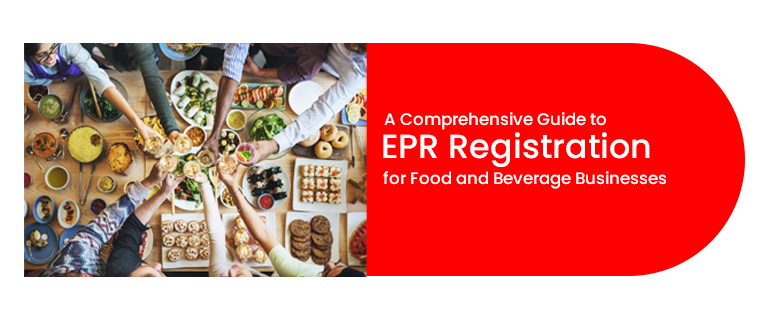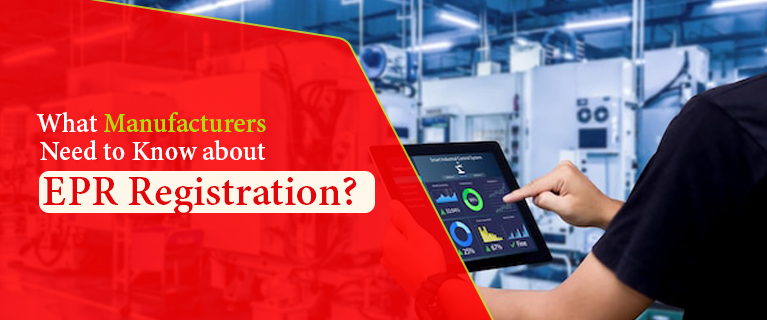A Comprehensive Guide To EPR Registration For Food And Beverage Businesses
In an era marked by increased environmental awareness and sustainable business practices, the importance of Environmental Product Responsibility (EPR) registration cannot be overstated, especially for the thriving Food and Beverage (F&B) industry. EPR serves as a pivotal framework for businesses aiming to minimize their environmental footprint and contribute to the broader goal of ecological sustainability.
Understanding EPR in the F&B Sector:
What is EPR?
Environmental Product Responsibility (EPR) is a policy approach that places the responsibility for managing the environmental impact of products on the manufacturers, producers, and importers. It is a proactive strategy that encourages businesses to take ownership of the entire lifecycle of their products, from production to disposal.
Read Also This - The Essential Guide to EPR Registration for ElectronicsWhy is EPR Registration necessary for Food and Beverage Businesses?
1. Waste Reduction:
Impact: The F&B industry generates significant waste, including packaging materials and food remnants, contributing to environmental challenges.
EPR Solution: By embracing EPR, F&B businesses commit to reducing waste through efficient packaging, recycling initiatives, and sustainable disposal practices.
2. Product Lifecycle Management:
Impact: Traditional linear production models contribute to resource depletion and increased waste.
EPR Solution: EPR Registration encourages a shift towards circular economy principles, where products are designed for reuse, recycling, or safe disposal, promoting sustainable resource management.
3. Consumer Perception and Loyalty:
Impact: Modern consumers prioritize eco-friendly and socially responsible brands.
EPR Solution: EPR registration enhances the reputation of F&B businesses, attracting environmentally conscious consumers and fostering brand loyalty.
Navigating the EPR Registration Process:
1. Assessment of Applicability:
Understanding EPR Scope: F&B businesses need to assess whether their products fall within the scope of EPR regulations. This includes packaged food items, beverages, and associated packaging materials.
2. Collection and Reporting Requirements:
Data Compilation: Gathering data on the types and quantities of products placed in the market is essential.
EPR Reporting: F&B businesses must prepare comprehensive reports on the environmental impact of their products, including details on packaging materials, recycling initiatives, and waste management practices.
3. Collaboration with Stakeholders:
Engaging Producers and Suppliers: Collaboration with upstream and downstream stakeholders in the supply chain is crucial.
Promoting Sustainable Practices: Encouraging suppliers to adopt eco-friendly packaging and sustainable sourcing practices contributes to overall EPR Registration goals.
4. Packaging Optimization:
Eco-friendly Packaging: F&B businesses can explore alternatives such as biodegradable packaging, reduced packaging materials, and increased use of recyclable materials.
Compliance Assurance: Adhering to guidelines of EPR Registration ensures that packaging aligns with environmental sustainability objectives.
5. Waste Management Initiatives:
Waste Reduction Strategies: Implementing effective waste management strategies, including recycling programs and waste reduction initiatives, demonstrates commitment to EPR principles.
Compliance Monitoring: Regular monitoring of waste management practices ensures ongoing compliance with EPR regulations.
The Role of LegalRaasta in EPR Registration for F&B Businesses:
1. Guidance on Regulatory Compliance:
In-depth Knowledge: LegalRaasta provides F&B businesses with comprehensive guidance on understanding and complying with EPR regulations.
Tailored Solutions: Tailoring strategies to the specific needs of the F&B sector ensures effective EPR implementation.
2. Documentation and Reporting Support:
Streamlined Processes: LegalRaasta streamlines the documentation process, aiding F&B businesses in compiling accurate and comprehensive reports.
Timely Reporting: Timely submission of EPR reports is facilitated, ensuring businesses meet regulatory deadlines.
3. Stakeholder Engagement:
Collaboration Strategies: LegalRaasta assists F&B businesses in developing effective strategies for engaging with stakeholders, fostering collaboration for sustainable practices.
Communication Plans: Crafting communication plans to convey EPR registration initiatives to suppliers, producers, and consumers enhances transparency.
4. Packaging Compliance:
Optimizing Packaging: LegalRaasta offers insights into optimizing packaging materials and designs to align with EPR guidelines.
Continuous Compliance Monitoring: Ongoing monitoring ensures that packaging practices remain compliant with evolving EPR standards.
5. Waste Management Solutions:
Customized Waste Solutions: LegalRaasta aids F&B businesses in developing tailored waste management solutions that align with principles of EPR Registration.
Adaptability to Changes: Adapting waste management practices to changing regulatory landscapes ensures continuous compliance.
Conclusion:
As the F&B industry navigates the complexities of environmental sustainability, EPR registration emerges as a pivotal tool for fostering responsible business practices. LegalRaasta, with its expertise in regulatory compliance and tailored solutions, stands as a valuable partner for F&B businesses seeking to embrace the principles of EPR Registration. Through collaborative efforts, optimized packaging, and strategic waste management, the F&B sector can not only meet EPR requirements but also contribute significantly to a more sustainable and eco-conscious future.




Comments
Post a Comment